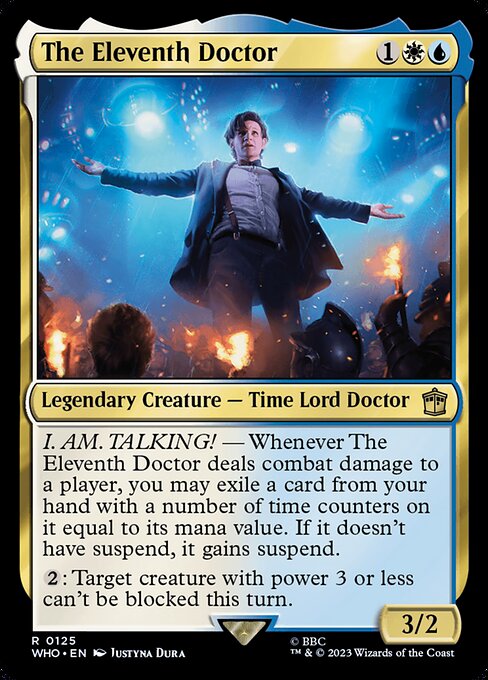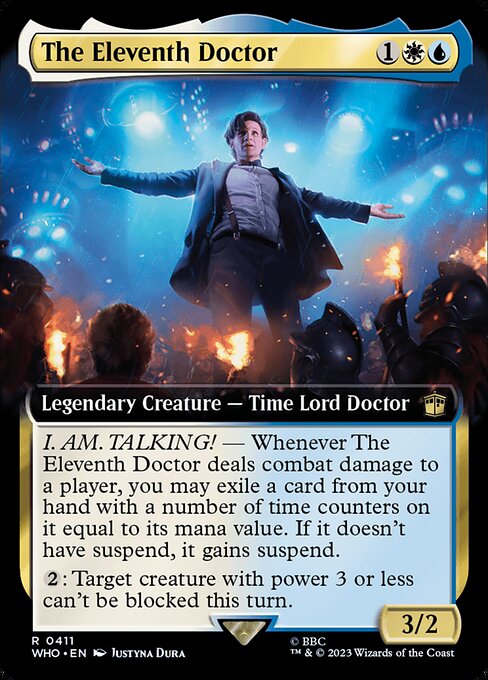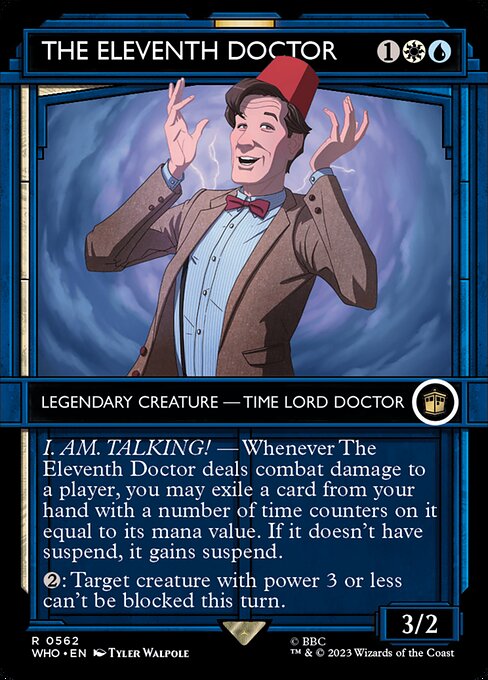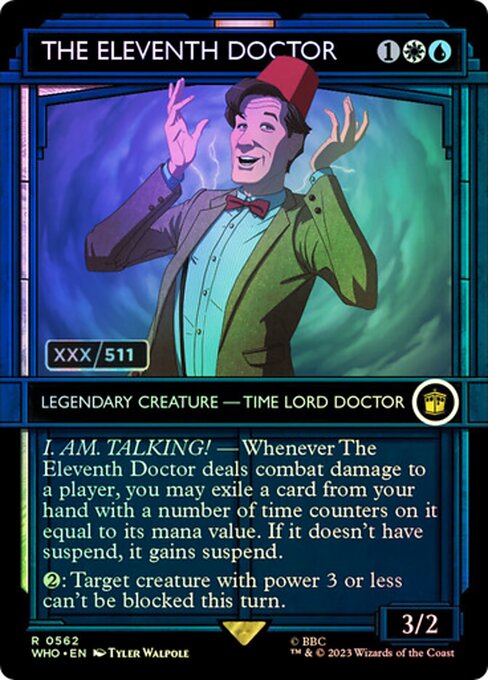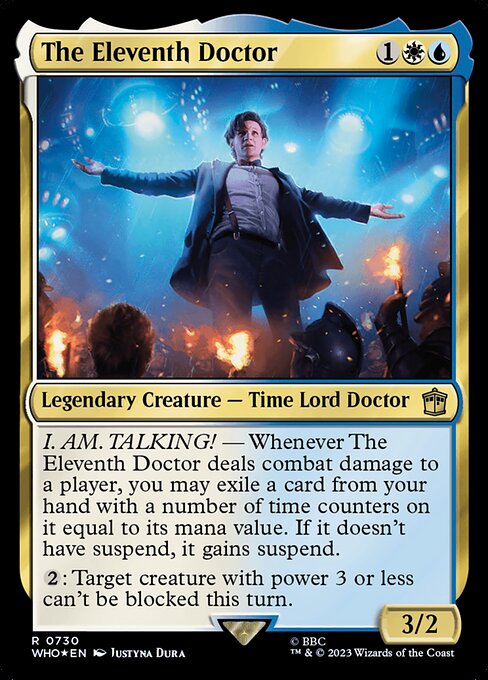The Eleventh Doctor
Legendary Creature — Time Lord Doctor
I. AM. TALKING! — Whenever The Eleventh Doctor deals combat damage to a player, you may exile a card from your hand with a number of time counters on it equal to its mana value. If it doesn't have suspend, it gains suspend.
: Target creature with power 3 or less can't be blocked this turn.
: Target creature with power 3 or less can't be blocked this turn.
3/2
standard
future
historic
gladiator
pioneer
explorer
modern
legacy
pauper
vintage
penny
commander
brawl
alchemy
paupercommander
duel
oldschool
premodern
Rulings
If you can't cast the card, perhaps because there are no legal targets available, it remains exiled with no time counters on it, and it's no longer suspended.
If the card has in its mana cost, you must choose 0 as the value of X when casting it without paying its mana cost.
When the last time counter is removed, the second triggered ability of suspend (the one that lets you cast the card) triggers. It doesn't matter why the last time counter was removed or what effect removed it.
If an effect instructs you to choose a creature type, you may choose Time Lord.
If the spell requires any targets, those targets are chosen when the spell is finally cast, not when the card is exiled.
Exiling a card with suspend isn't casting that card. This action doesn't use the stack and can't be responded to.
After The Eleventh Doctor's last ability resolves, that creature can't be blocked this turn even if its power later increases to greater than 3.
You are never forced to activate mana abilities to pay costs, so if there is a mandatory additional mana cost (such as from Thalia, Guardian of Thraben), you can decline to activate mana abilities to pay for it and hence fail to cast the suspended card, leaving it in exile.
As the second triggered ability resolves, you must cast the card if able. You must do so even if it requires targets and the only legal targets are ones that you really don't want to target. Timing permissions based on the card's type are ignored.
The mana value of a spell cast without paying its mana cost is determined by its mana cost, even though that cost wasn't paid.
Suspend is a keyword that represents three abilities. The first is a static ability that allows you to exile the card from your hand with the specified number of time counters (the number before the dash) on it by paying its suspend cost (listed after the dash). The second is a triggered ability that removes a time counter from the suspended card at the beginning of each of your upkeeps. The third is a triggered ability that causes you to cast the card when the last time counter is removed. If you cast a creature spell this way, it gains haste until you lose control of that creature (or, in rare cases, you lose control of the creature spell while it's on the stack).
If you cast a card "without paying its mana cost," such as with suspend, you can't choose to cast it for any alternative costs. You can, however, pay additional costs. If the card has any mandatory additional costs, you must pay those if you want to cast the card.
If the card has in its mana cost, you must choose 0 as the value of X when casting it without paying its mana cost.
When the last time counter is removed, the second triggered ability of suspend (the one that lets you cast the card) triggers. It doesn't matter why the last time counter was removed or what effect removed it.
If an effect instructs you to choose a creature type, you may choose Time Lord.
If the spell requires any targets, those targets are chosen when the spell is finally cast, not when the card is exiled.
Exiling a card with suspend isn't casting that card. This action doesn't use the stack and can't be responded to.
After The Eleventh Doctor's last ability resolves, that creature can't be blocked this turn even if its power later increases to greater than 3.
You are never forced to activate mana abilities to pay costs, so if there is a mandatory additional mana cost (such as from Thalia, Guardian of Thraben), you can decline to activate mana abilities to pay for it and hence fail to cast the suspended card, leaving it in exile.
As the second triggered ability resolves, you must cast the card if able. You must do so even if it requires targets and the only legal targets are ones that you really don't want to target. Timing permissions based on the card's type are ignored.
The mana value of a spell cast without paying its mana cost is determined by its mana cost, even though that cost wasn't paid.
Suspend is a keyword that represents three abilities. The first is a static ability that allows you to exile the card from your hand with the specified number of time counters (the number before the dash) on it by paying its suspend cost (listed after the dash). The second is a triggered ability that removes a time counter from the suspended card at the beginning of each of your upkeeps. The third is a triggered ability that causes you to cast the card when the last time counter is removed. If you cast a creature spell this way, it gains haste until you lose control of that creature (or, in rare cases, you lose control of the creature spell while it's on the stack).
If you cast a card "without paying its mana cost," such as with suspend, you can't choose to cast it for any alternative costs. You can, however, pay additional costs. If the card has any mandatory additional costs, you must pay those if you want to cast the card.
Rulings
If you can't cast the card, perhaps because there are no legal targets available, it remains exiled with no time counters on it, and it's no longer suspended.
If the card has in its mana cost, you must choose 0 as the value of X when casting it without paying its mana cost.
When the last time counter is removed, the second triggered ability of suspend (the one that lets you cast the card) triggers. It doesn't matter why the last time counter was removed or what effect removed it.
If an effect instructs you to choose a creature type, you may choose Time Lord.
If the spell requires any targets, those targets are chosen when the spell is finally cast, not when the card is exiled.
Exiling a card with suspend isn't casting that card. This action doesn't use the stack and can't be responded to.
After The Eleventh Doctor's last ability resolves, that creature can't be blocked this turn even if its power later increases to greater than 3.
You are never forced to activate mana abilities to pay costs, so if there is a mandatory additional mana cost (such as from Thalia, Guardian of Thraben), you can decline to activate mana abilities to pay for it and hence fail to cast the suspended card, leaving it in exile.
As the second triggered ability resolves, you must cast the card if able. You must do so even if it requires targets and the only legal targets are ones that you really don't want to target. Timing permissions based on the card's type are ignored.
The mana value of a spell cast without paying its mana cost is determined by its mana cost, even though that cost wasn't paid.
Suspend is a keyword that represents three abilities. The first is a static ability that allows you to exile the card from your hand with the specified number of time counters (the number before the dash) on it by paying its suspend cost (listed after the dash). The second is a triggered ability that removes a time counter from the suspended card at the beginning of each of your upkeeps. The third is a triggered ability that causes you to cast the card when the last time counter is removed. If you cast a creature spell this way, it gains haste until you lose control of that creature (or, in rare cases, you lose control of the creature spell while it's on the stack).
If you cast a card "without paying its mana cost," such as with suspend, you can't choose to cast it for any alternative costs. You can, however, pay additional costs. If the card has any mandatory additional costs, you must pay those if you want to cast the card.
If the card has in its mana cost, you must choose 0 as the value of X when casting it without paying its mana cost.
When the last time counter is removed, the second triggered ability of suspend (the one that lets you cast the card) triggers. It doesn't matter why the last time counter was removed or what effect removed it.
If an effect instructs you to choose a creature type, you may choose Time Lord.
If the spell requires any targets, those targets are chosen when the spell is finally cast, not when the card is exiled.
Exiling a card with suspend isn't casting that card. This action doesn't use the stack and can't be responded to.
After The Eleventh Doctor's last ability resolves, that creature can't be blocked this turn even if its power later increases to greater than 3.
You are never forced to activate mana abilities to pay costs, so if there is a mandatory additional mana cost (such as from Thalia, Guardian of Thraben), you can decline to activate mana abilities to pay for it and hence fail to cast the suspended card, leaving it in exile.
As the second triggered ability resolves, you must cast the card if able. You must do so even if it requires targets and the only legal targets are ones that you really don't want to target. Timing permissions based on the card's type are ignored.
The mana value of a spell cast without paying its mana cost is determined by its mana cost, even though that cost wasn't paid.
Suspend is a keyword that represents three abilities. The first is a static ability that allows you to exile the card from your hand with the specified number of time counters (the number before the dash) on it by paying its suspend cost (listed after the dash). The second is a triggered ability that removes a time counter from the suspended card at the beginning of each of your upkeeps. The third is a triggered ability that causes you to cast the card when the last time counter is removed. If you cast a creature spell this way, it gains haste until you lose control of that creature (or, in rare cases, you lose control of the creature spell while it's on the stack).
If you cast a card "without paying its mana cost," such as with suspend, you can't choose to cast it for any alternative costs. You can, however, pay additional costs. If the card has any mandatory additional costs, you must pay those if you want to cast the card.
Your collection? Your decks?
Want to manage your collection and/or create decks?
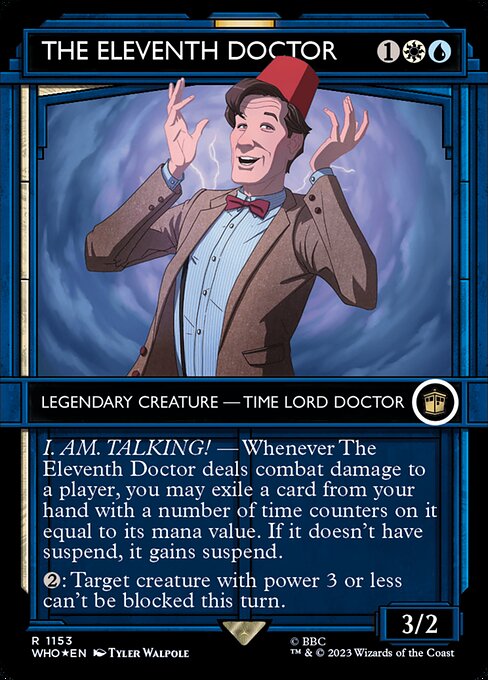


 0
0
 6.46€
6.46€
